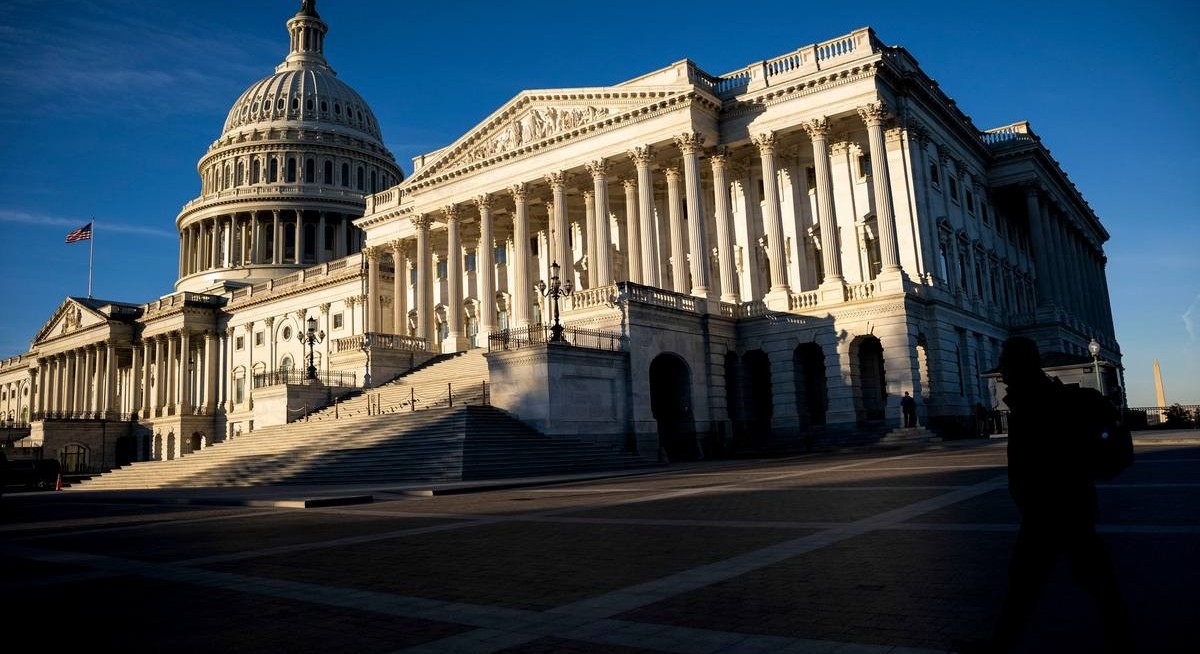Vice president JD Vance cast the tie-breaking vote.
The package, which now goes to the House, combines US$4.5 trillion in tax cuts with US$1.2 trillion in spending cuts.
“This was a team effort,” Senate Majority Leader John Thune told reporters immediately following the vote on Tuesday. “In the end we got the job done.”
The package — informally known as the “One Big Beautiful Bill” — includes the entirety of the president’s legislative agenda in a single package.
See also: US House defies Trump and votes to end his Canada tariffs
Trump personally lobbied lawmakers to quickly move the legislation through Congress.
Republicans say passing the bill will help them maintain their congressional majorities in the midterms. But polling suggests the bill is not particularly popular.
A recent Pew Research survey found that 49% of Americans oppose the bill, while 29% supported it.
See also: EPA to scrap landmark US emissions policy in major rollback
Some 21% weren’t sure what to think.
The ouse is expected to vote on the bill this week, but success is not guaranteed.
Only a few Republicans can vote “no” in the House for the bill to pass in the face of united Democratic opposition.
Conservatives there say they are still pushing for more spending cuts while moderates have expressed alarm at the Senate bill’s reductions to Medicaid and other social safety net programs.
The Senate bill would raise the state and local tax deduction from US$10,000 to US$40,000 for just five years, sparking opposition from one New York Republican who views it as inadequate.
Meanwhile, cuts to hospital payments have moved others to declare their opposition.
Any changes in the House would force the Senate to take up the bill again, scuttling Trump’s plans to sign the bill by July 4.
To stay ahead of Singapore and the region’s corporate and economic trends, click here for Latest Section
Trump agenda
Republicans have said the legislation will boost the economy, curb illegal immigration and start the process of cutting waste in Medicaid and other entitlement programs.
The tax cut bill would avoid a large tax increase for individuals at the start of next year when the 2017 Trump tax cuts expire and it would permanently extend some partly expired business tax breaks, which the president has said would contribute to economic growth.
Many economists, however, have warned that the bill provides little economic boost and exacerbates the country’s fiscal woes.
The “US fiscal path is not a sustainable one,” US Federal Reserve (US Fed) Chair Jay Powell said Tuesday. “The level of the debt is sustainable but the path is not, and we need to address that sooner or later. Sooner is better than later.”
At Trump’s request, the bill adds new tax breaks for tips, car loans and overtime work and expands tax breaks for seniors and parents that he popularised on the campaign trail.
These new tax breaks are funded by deep cuts to the renewable energy sector, a move that will ultimately benefit the fossil fuel industry.
The popular electric vehicle tax credit would be axed, something that sparked outrage from Trump’s one-time staunch ally Elon Musk, whose Tesla Inc. would suffer.
The bill would send hundreds of billions in new funds to the military, solidifying Trump’s emphasis on hard power over foreign aid, which he has slashed. It also would boost funding for immigration enforcement.
These costly tax cuts and spending increases are partly paid for by spending cuts primarily targeted at Medicaid, food stamps and federal student loans.
Democrats say the cuts to anti-poverty programs combined with the tax cuts that disproportionately benefit the wealthy make the bill highly regressive. They also point out the US$3.3 trillion increase in deficits over ten years despite GOP claims of fiscal responsibility.
Nearly US$1 trillion would be cut from Medicaid by imposing a new work requirement for able-bodied adults without children, imposing co-pays and limiting federal reimbursements to states. Food stamp work requirements would expand and states with error-prone systems would be penalised.
The Congressional Budget Office estimates 11.8 million people could lose health coverage over the course of a decade as a result of the bill.
The legislation would avoid a US payment default as soon as August by raising the debt limit by US$5 trillion. Trump and Republicans argued that using the partisan budget reconciliation process to raise the limit without Democrats allows the GOP to avoid making any concessions to the minority party, such as increased spending on domestic programs.
Senators during the final negotiations voted to kill a controversial effort to prevent US states from regulating artificial intelligence, marking a loss major technology companies including Microsoft Corp and Meta Platforms Inc, as well as venture capital firms like Andreessen Horowitz, that pushed the measure to stave state-level rules.




